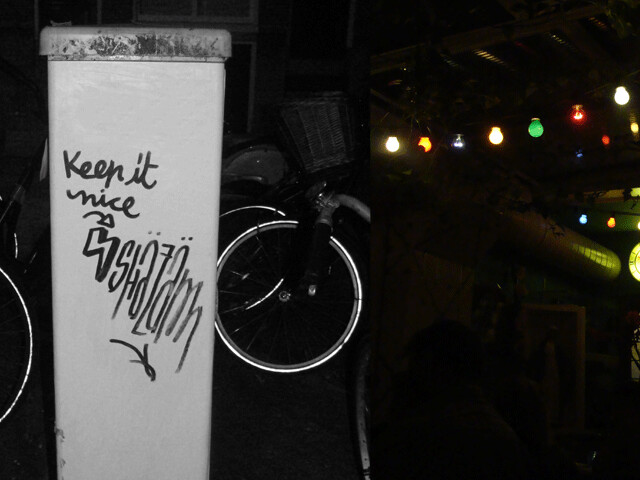On the opposite wall, graffiti: smiley face and arrows, Warning Radioactive, stencilled lightning bolt with the word Shazam, dripping horror movie letters, keep it nice!
The Goldfinch circles around Amsterdam. The final third of the book is set there. And the quote above was perhaps my favourite moment of that sludgy, long, and repetitious last part. Weirdly, I know the guys who painted that piece, and who used these tags all over the city (and beyond – in Barcelona, we had to stop one of them from tagging a moving street cleaning van). So reading this, I finally knew that Donna Tartt had actually spent time in Amsterdam, a fact that had been repeatedly underlined in the hype around the book.
Because something I found baffling about The Goldfinch – probably THE fiction event of 2013/14, let’s not forget – was how incredibly sloppy it was with details.
***SPOILERS FOLLOW***
Theo’s Amsterdam hotel is on the Singel canal, but after a trip to meet his pal Boris, the hotel has moved to Herengracht. Their drive from the airport to Singel takes in Nieuwemarkt, which is a nonsensical route: A to C via F. And before they leave for Amsterdam, Boris warns Theo to stock up on Duty Free liquor, because “booze only available in the state controlled shops”. In the Netherlands, of all places? Uh, nope. Was Tartt thinking of Sweden, maybe?
Since I lived in Amsterdam, it was in this section that they most leapt out at me, but the entire book is riddled with cheap errors. There are at least a couple of references to the drinking age in the US (New York/Nevada) being 18. How does an American author get something like that wrong? Especially when they’ve spent a decade working on the book…
This leaves me scratching my head when a reviewer praises Tartt’s “Dutch master’s attention to detail” (Ron Charles, The Washington Post). James Wood, in a New Yorker review more argued with than read (well, it is behind a paywall) famously criticised Tartt’s novel, arguing that the novel’s “tone, language, and story belong to children’s literature”. This of course spurred fans of the book to furious rebuttals.
But that’s not an axe I’m grinding. I found the prose tended towards the beautiful, the book’s pages littered with arresting images:
Floodlit window. Mortuary glow from the cold case. Beyond the fog-condensed glass, trickling with water, winged sprays of orchids quivered in the fan’s draft: ghost-white, lunar, angelic.
I agree with many commenters that the novel was overlong. Some of those digressions on the meaning, history, and techniques of art felt repetitious. But that might not have been a problem if the plot had been stronger.
This is another frequently praised aspect of The Goldfinch that leaves me wondering. Lev Grossman contends that “the narrative thread is one you just can’t gather up fast enough” (review tucked away behind another paywall).
Conversely, I felt that I was left holding a number of plot threads that weren’t connected to any moving parts. Tartt is clearly more comfortable with the rarified, moneyed Upper East Side/Hamptons scene – but nothing of consequence happens here. When a threat to Theo does emerge from amongst the expensive antiques, it eventually evaporates in a cloud of convenience.
Boris, and his Eastern European cohorts, come off hackneyed, and it is from this cartoonish demi monde that the issue of the stolen painting is “resolved”. But through much of the action, the narrator Theo is a passive bystander, dragged into set-up after set-up with little understanding. The major events in the life of the painting itself happen off-screen, and/or entirely without Theo’s understanding. The major threat to Theo’s freedom – that his possession of the missing painting may be discovered – is a faint note, tediously unwavering and never truly credible.
Honestly, I wanted to love this book. Maybe it was the hype, the reclusive enigma of la Tartt herself. Maybe it was overinflating how much I’d enjoyed The Secret History, all those years ago. Whatever it was, it didn’t deliver. I was promised a literary firecracker, and instead I had to slog through 700-plus pages of a soggy fuse failing to light, culminating in a whimpering misfire.
